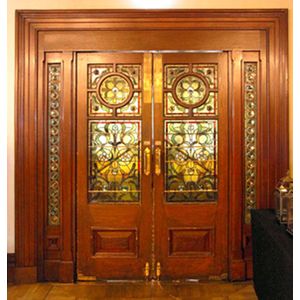Red Lacquered Wedding Cabinet with Fretwork and Carved Panels
You must be a subscriber, and be logged in to view price and dealer details.
Subscribe Now to view actual auction price for this item
When you subscribe, you have the option of setting the currency in which to display prices to $Au, $US, $NZ or Stg.
- Lacquered Lacquerware - Lacquer is a clear or coloured resin that is obtained from the sap of several species of trees in the genus Rhus, particularly the Rhus verniciflua tree, which is native to China and Japan. The resin is harvested by making incisions in the tree bark and collecting the sap that oozes out.
The sap is then processed and refined through a series of steps, which may include filtration, heating, and chemical treatments. The resulting lacquer is a highly durable and glossy material that is used as a finish for furniture, musical instruments, and other objects.
Lacquer has been used for thousands of years in Asia, where it is valued for its beauty and durability. It is applied in multiple thin layers, with each layer being allowed to dry and harden before the next one is added. The process can take several weeks or even months to complete, but the resulting finish is incredibly hard, glossy, and resistant to scratches and wear.
The lacquer derived from the resin of the Rhus tree has been used for decoration of furniture in several countries in Asia, particularly China, Japan, Korea, and Vietnam. These countries have rich traditions of using lacquer for furniture decoration and have developed unique techniques and styles of lacquer work.
In China, lacquer has been used for furniture decoration for over 2,000 years, and it became a major art form during the Ming (1368-1644) and Qing (1644-1912) dynasties. Chinese lacquerware is known for its intricate carving, painting, and inlay work, as well as its use of bold colours and designs. Lacquer was used to decorate furniture such as cabinets, screens, and chairs.
In Japan, lacquer has been used for furniture decoration for over 1,000 years. Japanese lacquerware is characterized by its simplicity and elegance, and it often incorporates natural materials such as wood, bamboo, and shells. Lacquer was used to decorate furniture such as chests, cabinets, and trays.
In Korea, lacquer has been used for furniture decoration for over a thousand years. Korean lacquerware is known for its restrained and understated beauty, and it often features delicate patterns and designs that are achieved through careful layering and carving. Lacquer was used to decorate furniture such as cabinets, chests, and screens.
In Vietnam, lacquer has been used for furniture decoration for over 2,000 years. Vietnamese lacquerware is known for its vibrant colours and intricate designs, and it often features scenes from daily life, nature, and mythology
This item has been included into following indexes:
-
Chinese furniture, type or function
- chests and trunks 283
- storage cabinets 609
Visually similar items

A Louis XIV style ebonised and red Boullework pier cabinet. second half 19th century. The black marble top with canted corners above a brass and faux red tortoiseshell foliate embellished frieze and two similarly decorated panelled cupboards, raised on a s

A tall black lacquer cabinet, the door panels picked out in red and carving highlighted in gilt, 19th century, original metal hinges and door clasp, a shelf and two internal drawers, raised on low scroll feet with carved apron below the external drawers. C

The grand entrance doors to the original Cliveden dining hall, featuring stained and leaded glass with a rose medallion in each panel, below, further stained and leaded glass floral designs, flanked by narrow leadlight panels within an architrave. These do

A Japanese two leaf ebonised and red lacquer decorative screen, early 20th century, the floor screen with a pierced and relief carved crest with bird and flower decorations above a deep red panel framing a reserve of birds perched and flying amidst wisteri
